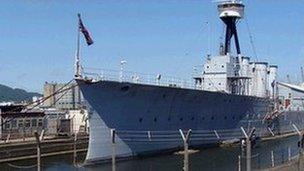HMS Caroline veterans wanted for oral history project
- Published

It was announced in October that WWI cruiser HMS Caroline would remain at Alexandra Dock in Belfast
Veterans and relatives of those who served on World War One warship HMS Caroline are being asked to contribute to an oral history project.
The National Museum of the Royal Navy (NRMN) is undertaking the project.
The vessel is the last survivor of the 1916 Battle of Jutland.
Last month it was announced that the ship, which has been berthed in Alexandra Dock in Belfast since 1923, would stay here and be restored "to her former glory".
Prof Dominic Tweddle, NMRN director general, said: "Many of us breathed a huge sigh of relief and following our collective efforts to rescue this magnificent piece of history, we want to bring Caroline back to life and collect as many stories from relatives of those who served on her and possibly actual veterans themselves."
NI Tourism minister Arlene Foster has described the ship as "an important part of Northern Ireland's maritime history".
"HMS Caroline is a strong and distinctive part of Belfast's Titanic Quarter and it is important that the full story is told," she said.
"So many people from different walks of life will have had a connection with the ship, whether themselves or through a family member, during the 99 years of its life.
"If these memories can be recorded, they will add to what is already a rich tapestry of maritime history in Northern Ireland."
The National Heritage Memorial Fund (NHMF) has pledged £1m to help to restore the warship.
Mrs Foster's department has set aside up to £100,000 this year for "remedial work" on HMS Caroline and is also in talks with the Heritage Lottery Fund.
There was controversy earlier this year over plans to move it back to England.
In June, the National Museum of the Royal Navy (NMRN) said it was planning to lift the vessel and move it to Portsmouth where it would be restored.
Days later, a campaign aimed at keeping the ship in Northern Ireland was officially launched.
In October it was announced that it would remain in Belfast.
HMS Caroline was built at Birkenhead in 1914 and was one of the fastest warships of its time.
It is the last survivor of the Grand Fleet that fought at Jutland.
When the ship came to Belfast in 1923 it acted as a floating administrative base in World War Two.
It was decommissioned as the headquarters of the Ulster Division of the Royal Naval Reserve in March 2011.
Anyone with information relevant to the oral history is asked to contact the National Museum of Royal Navy through the Friends of Caroline organisation by emailing Pete Bleakley at pete@bigdukesix.co.uk.
- Published11 October 2012
- Published1 August 2012
- Published29 June 2012
- Published8 June 2012